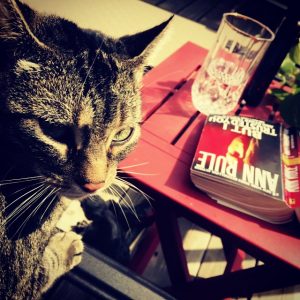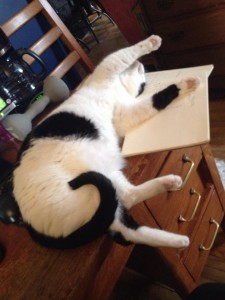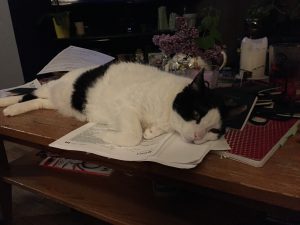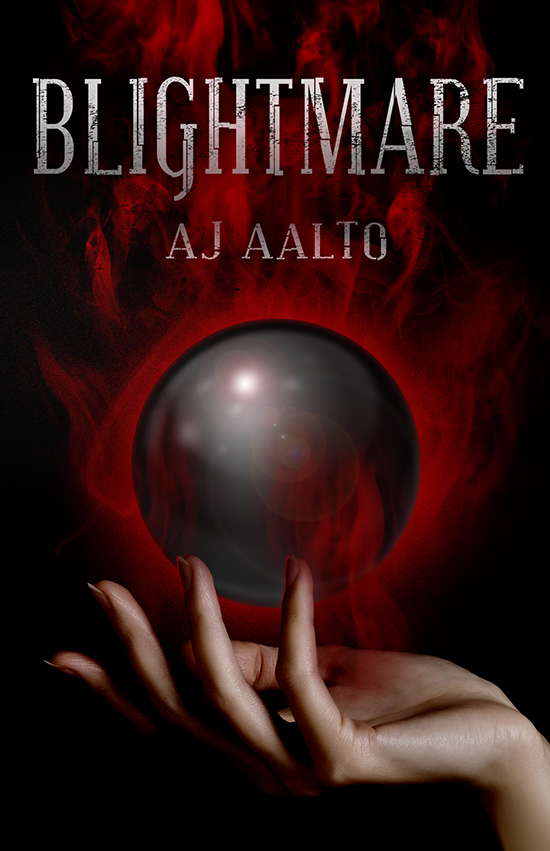November
6
 Today’s author in the interview seat is Massimo Marino of Daimones fame. Massimo is member of SFWA (Science Fiction and Fantasy Writers of America), and a scientist envisioning science fiction.
Today’s author in the interview seat is Massimo Marino of Daimones fame. Massimo is member of SFWA (Science Fiction and Fantasy Writers of America), and a scientist envisioning science fiction.
He contributed to the experiments at CERN and The Lawrence Berkeley Lab, then accepted leading positions at Apple, Inc. and at the World Economic Forum. He is also co-founder of “Squares on Blue” — a Big Data Analytics service company — and of “BookGarage” — a publishing services brokerage firm.
He’s graciously agreed to answer some questions for us.
AJ: As a biologist, my background tends to sneak into my writing when crafting monsters and viruses. Tell me a bit about how you think your background in science affects the way you approach writing.
Massimo: There’s a saying in writing which goes like: write what you know. It does not mean to literally writing just about what you have direct experience on (otherwise, we would only have gotten stories about bugs from William Burroughs, and medical tales and their patients from the like of Arthur Conan Doyle), but one cannot deny that whatever experience a writer has gone through can (and actually does) show in his novels. Writing what a writer knows also means do your research when writing about a subject. Do not pretend: there are expert readers whose guts would twist reading nonsense from a writer.
This said, and sorry for the long prologue, I am influenced by my background in physics and research. The scientific element in my story rests on solid ground, even when extrapolated to imagine new technology breakthrough, which are still a possibility—although rare—from fringe theories and yet-to-be tested ideas. My scientific work might also have helped me in writing plausible science fiction stories, and avoid holes in the plot which has to be consistent, and follow principles of consequentiality.Surviving an apocalyptic event leads to a smashing beginning for your Daimones Trilogy. What is it about a worldwide annihilation that stirred your creative engine while writing this series?
AJ: Surviving an apocalyptic event leads to a smashing beginning for your Daimones Trilogy. What is it about a worldwide annihilation that stirred your creative engine while writing this series?
Massimo: It has to do with many of the things we tend to ignore and pretend they will not have consequences ever. In addition to that, our own daemons and violence perpetrated on Nature, the idea that if external civilizations were to judge us they would find us lacking many traits conducive to granting us a free pass in the Universe. Last, worldwide annihilation creates situations where madness flirts with reason and I liked the stress it caused on my characters.
AJ: Tell us a bit about your publishing journey before, during, and after Booktrope. Would you have any advice for writers considering a hybrid publisher or self-publishing, as opposed to a small press or traditional large press?
Massimo: It took quite some time before publishing anything. I started writing when I was about six years old. My dad received Astounding Stories magazine and I was fascinated by its covers. My story started from there, or ended up justifying the cover that marveled me the most.
In 2012, I completed Daimones, my first full-length SF novel. I started querying agents and publishers and collected my rejection letters. A good number were personal and encouraging, justifying the rejection on a difficult market for my story. After a few months of doing that, I decided to try the independent publishing (no Vanity Press, though! Those are there only to dig into authors’ pockets). Daimones was followed by a second novel, then a third. All together they sold over 10,000 copies (mostly ebooks at a price ranging from 3.99 to 4.99 with usual promos at 0.99 here and there) until I met with an agent at a writers conference. We hit it off, read and liked my novels, and she introduced me to Booktrope that republished the trilogy.
I don’t think there’s a right path that everyone has to follow. Each has advantages and disadvantages. For sure, being independent no more has the stigma of the beginning and a good indie author can sell more and to more readers by being indie.
As a writer, I’ve enjoyed experiencing the traditional publishing approach that was offered to me by Booktrope, but it didn’t do much in terms of revenues with respect to times before.
AJ: Can you give us a hint as to what project(s) you’re currently working on and your future publishing arc?
My fourth novel, “The Law,” is about the reasons of the heart versus the diktats of the brain. The struggle between what you *feel* you must do, and what you *must* do because of how you feel.
“The Law” covers the themes of “Law and Order”, racial tensions, repression for security, and love between two young members of different races who believe they can change the world.
It is available at Amazon now. It is the first volume of a new SF trilogy, with a YA spin.
AJ: Many artists need a very specific setting in which to create. When you work, do you have any quirks or use any aids to get you in the zone?
Massimo: I’m not one of them. With my apologies to Dr. Seuss:
I can write in a car,
I can write by a fire,
I can write in a boat, I can write on a float.
I can write on a table, I can write when I’m able;
I can write anywhere.
AJ: Do you find that your writing style changes at all with the conflicts or challenges that you’re juggling in your real life? That your day-to-day experiences colour your writing?
Massimo:To tell you the truth, I try as much as possible to think about ‘my style.’ I believe in a style that’s difficult to ‘see,’ and that makes every new story fresh and pristine. Too often, we take writing quirks and habits as the trait of a style. I don’t want any.
AJ: In the Daimones Trilogy, there are “the Selected” and “the Spared.” What can you tell us about the research you did to invent a neurological drug that would contribute to rapid evolution, and to create believable transgenic characters.
Massimo: Nootropic, neuroprotective and neurotrophic drugs are at the edge of scientific research, to become crucial in neurological diseases and illnesses, and to enhance our capabilities to levels unknown today. I spent time and discussions with researchers in the field, and read a lot about that domain to come out fascinated and dreaming of all possibilities. As with physics, there are areas of scientific research that make us feel we live in a science fiction world already.
AJ: Do you shy away from writing open-door sex scenes if the plot calls for it? Is there subject matter that you will not write? If so, where is that line and how do you feel your way around it?
Massimo: This question shows you must have dug into Daimones. Thank you. In short, whatever the plot calls for. The only line that I will not cross is that of decency, vulgarity, and profanity for the sake of it.
Things happen in real life, and we are confronted with atrocities, violence, and brutality. A writer shall not shy away from those if the plot needs them.
AJ: How do you, as a writer, get in touch with alien minds and motives? Does that require a lot of daydreaming time, or did it occur to you easily?
Massimo: It might be my time spent as an Apple Inc. executive: “Think Different.” Readers of the trilogy know what I mean, for others, it’s your chance to get into the minds of alter-beings.
Part of the process of getting into the mind of my alien beings, their motives, and their drives, lead me to see things from a different perspective that translated then into a non-exactly human reactions and actions.
AJ: How do you get inside your antagonist’s head without that taint rubbing off on you personally? Do you have any tricks when it comes to compartmentalizing and keeping yourself separate from your villains? Is it less complex when it’s species vs. species than human vs. human, or more complex?
Massimo: Hmm, you don’t. A writer, at least this writer, must suffer from multiple personality disorder. I believe it is not far from what professional actors face and experience. They do become ‘others’ in front of the camera, but they don’t get lost in the process. To tell you the truth, I don’t try to keep the distance from my characters; I try to embrace them, feel their motives, and understand their reasoning. It does not mean I justify them, though, as a writer of horror or criminal stories would find abhorrent the pleasure of a serial killer, or of a cannibal like Hannibal must feel when tasting their victim’s filet. Could you pass the pepper, please?






 Today’s author in the interview seat is
Today’s author in the interview seat is 



